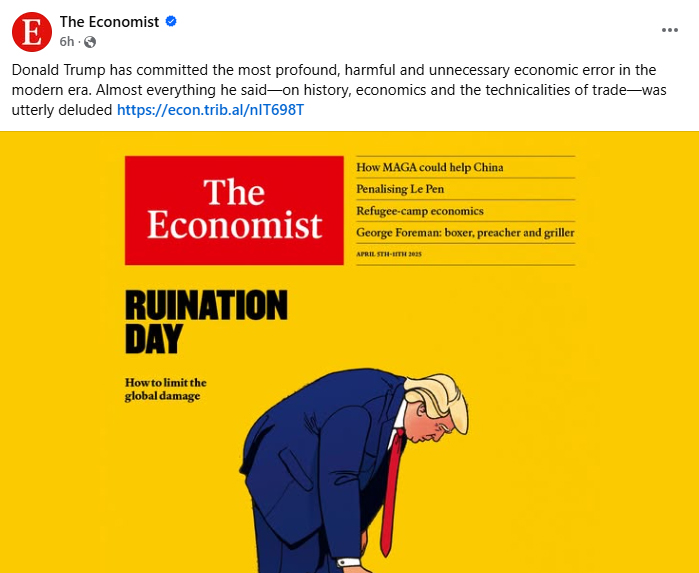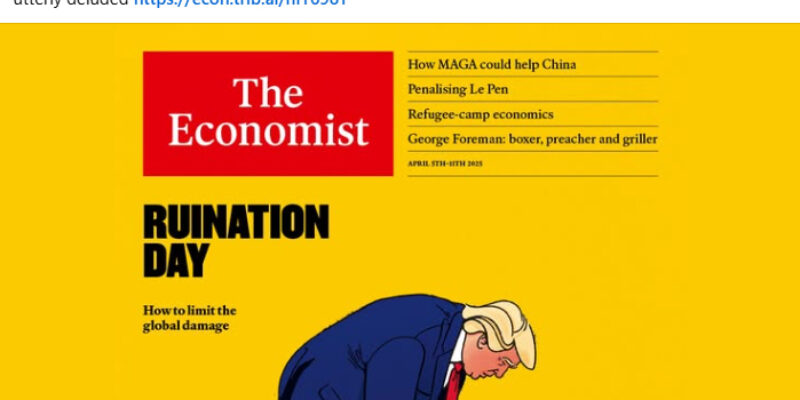We have a couple of John Kennedy video clips for you this morning, both pertaining to the biggest issue of the day: the Trump reciprocal tariffs which kicked in at midnight last night affecting trade with practically all of our trading partners.
The ruling-elite crowd here and globally, and particularly in Europe, are having a collective case of the vapors, and we now are amid a global condemnation of tariffs as a result of President Trump’s actions.
Nobody seems to recognize, of course, that the tariffs announced by the president are reciprocal, meaning that they’re calibrated to match the negative economic impact of trade policies by other countries which hamper the export of U.S. goods abroad.
Some of those policies are tariffs, and some are trade barriers of other types. Trump’s team has adopted a sliding scale based on the size of our trade imbalance relative to its volume.
And a number of countries – Mexico, Canada, Switzerland, India, Israel, and Vietnam, to name a few – have already signaled that they’re now willing to discuss lowering or eliminating tariffs and trade barriers as a means of escaping Trump’s reciprocal tariffs.
Which, interestingly enough, is the clear aim of the President in instituting those tariffs in the first place.
That doesn’t seem to be getting through to the ruling elite. For example, here’s the very hoity-toity The Economist, which has now declared rhetorical war on Trump…

There’s a colossal disconnect here, which is that these people are screaming about the tariffs and trade barriers Trump is throwing up and yet they don’t acknowledge the tariffs and trade barriers already in place from our trading partners that Trump’s tariffs are a response to.
So Europe’s barriers are good but Trump’s are not?
If they’re both bad, then why isn’t the response from The Economist that “Trump has laid down his marker, and we must have the wise response of creating truly free trade?”
The stunning dishonesty here is what rankles.
Now – we might decide to have an argument about whether what Trump is doing will generate the response he’s looking for. The experience with India, Israel and Vietnam indicates he’ll get what he’s after at least in part.
But in the case of China, he might not get it. And if so, then a great deal of our supply chain is likely to move elsewhere – Vietnam and India being a couple of very likely destinations.
And that’s not such a terrible thing, either, if we’re being honest.
This situation requires clear thinking and common sense, which means seeking the counsel of Sen. John Kennedy is always a good idea. So Kennedy was a guest on Fox News this morning with Bill Hemmer and Dana Perino, and he took issue with Democrats on Capitol Hill screeching about the destruction of America’s middle class that these tariffs will supposedly bring on.
Kennedy called those “WAG’s,” or “Wild Assed Guesses.” He said nobody knows what’s going to happen with these tariffs; China throws up massive trade barriers and runs an entirely mercantilist economy and the effect is generally deflationary rather than inflationary.
It’s a good segment and worth a watch.
But then Kennedy took to the Senate floor and offered an even more concentrated dose of common sense when he gave Canada’s prime minister Mark Carney, who has boo-hooed himself into utter beclownment over the tariffs while his government quietly negotiates a cessation of trade hostilities, some very good advice – after a good deal of buttering-up, that is…
Kennedy knows, in suggesting a complete takedown of trade barriers between the U.S. and Canada, that it would be a complete surrender to Trump’s trade agenda.
“There’s a way to stop this trade war, and it’s to remove the tariffs on both sides.”
Again, that is the point of reciprocal tariffs.
It seems inevitable that Kennedy’s advice is going to be taken, because opening markets is the most obvious way to prosperity over the long term. And if Carney would rather engage in a trade war that Canada can’t win – he wouldn’t, but he’s attempting to look strong in front of a Canadian electorate who knows him only as some faceless bureaucrat whose party installed him in his current office because Justin Trudeau was no longer sellable – then so be it.
The one thing Donald Trump shouldn’t be questioned on is negotiation. He’s a master at that art, and part of his mastery is his facility at setting the stage for the right result to become inevitable. So Trump spends the last several months casting himself as the most vociferous protectionist on the planet, dredging up the history of William McKinley’s America when a revenue tariff was the chief means of financing the U.S. government, and touting tariffs as a replacement for the income tax. And then when the tariffs come, lo and behold they’re reciprocal.
That’s when you realize that while Trump might want to explore diminishing the income tax and using a revenue tariff to replace it to the extent possible, which is what you do when you’re trying to spur the productive sector, what he’s after in the short term is opening up markets for American goods. When our trading partners see those tariffs, the reaction has already started to be as Kennedy said – a flood of trade representatives coming to Washington to negotiate new trade relationships based on lower tariffs on both sides.
This is something common sense can see coming. It’s disqualifying to the smart-set crowd at The Economist that they don’t.
Advertisement
Advertisement

